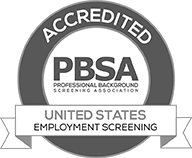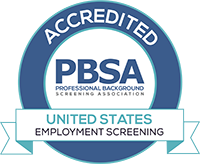BLOG
Illinois Restricted How Organizations May Use Criminal Records
January 18, 2022
About The Bill
Illinois’ State Bill 1480 (SB1480) was designed to provide second chances to individuals who have criminal records that are not violent (or otherwise serious) or relevant to a position being sought. It states that, with certain exceptions, it is a “civil rights violation for employers, employment agencies or labor unions to use a conviction record as a basis to refuse to hire, segregate or act with respect to recruitment, hiring, promotion, renewal of employment, selection for training or apprenticeship, discharge, discipline, tenure or terms, privileges or conditions of employment.”
The law requires employers to assess criminal records that they learn about, typically after reviewing a background check, when hiring, promoting and making other decisions. Its primary purpose is to prevent organizations from disregarding applicants simply because they have any type of conviction. Millions of Americans have criminal records. Many are for minor or outdated offenses that should not prevent them from finding employment, housing or other necessities.
Adverse Actions
Employers in IL may still take adverse actions, such as denial of employment, based on criminal records found in a background check. They may do so if:
- There is a substantial relationship between one or more of the previous criminal offenses and the employment sought or held;
- The granting or continuation of the employment would involve an unreasonable risk to property, the safety or welfare of specific individuals, or the general public.
First, the employer must conduct an assessment.
Assessing Criminal History
SB1480 explains what employers must do when determining if a conviction warrants action. They are required to consider:
- How many convictions a person has incurred.
- How much time has passed since each conviction.
- The nature and severity of any offense and its relationship to the safety and security of others.
- Circumstances surrounding the conviction.
- How old the person was at the time an offense occurred.
- Evidence of rehabilitation.
Proceeding With An Adverse Action
If an employer decides to take an adverse action based solely or in part on a conviction, they must inform the person in writing of:
- The disqualifying conviction(s).
- Any existing procedure to challenge the decision and request reconsideration.
- The right to file a charge with the Department.
Background Checks Are Still Important
While SB1480 creates guidelines about how businesses may consider convictions, running comprehensive background checks remains an essential part of the hiring process. These reports provide crucial information that help organizations make informed decisions and create safe workplaces. They are an important part of every employer's due diligence process.
We recommend consulting with counsel to ensure your policies are up-to-date and compliant with laws that are in effect where you operate.
Ordering Background Checks
If you need employment background checks, please contact us. Our experienced team can help you build custom packages that contain data you can use to help build strong teams. We are available to assist you Monday through Friday from 5am to 6pm.







